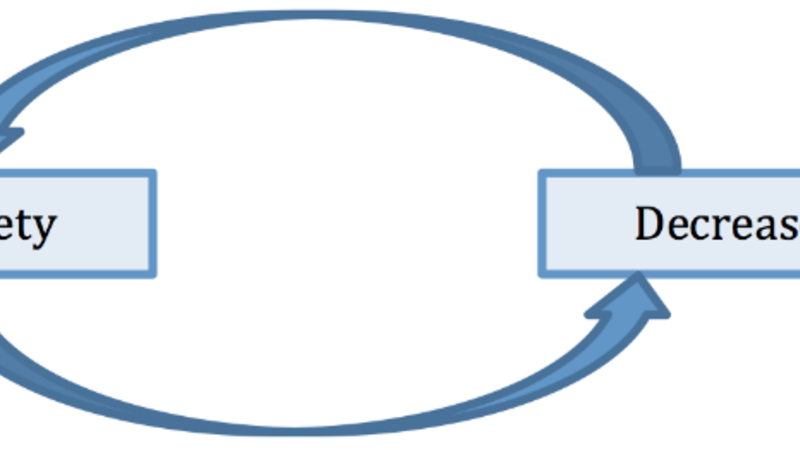The Relationship Between Maths Anxiety and Maths Performance
Maths anxiety describes feelings of fear, tension, apprehension or worry about mathematics. Research has long seen a relationship between maths anxiety and performance in maths tests. This relationship is similar to that seen between other forms of anxiety (e.g. test anxiety) and test performance, and consists of a small negative correlation. That is, as maths anxiety levels increase, maths test performance somewhat decreases. Whilst this relationship is consistently observed, there is a lack of consistency in the proposed direction of the relationship: that is, does maths anxiety cause people’s performance in maths to decrease, or does having poorer performance in maths cause people to become more anxious about the subject? The possible directions of the relationship between anxiety and performance can be summarised with two different theories: The Deficit Theory and the Deleterious Anxiety Model.
The Deficit Theory
The Deficit Theory suggests that people who start out with poorer maths performance are more likely to develop anxiety about maths, as summarised in the following diagram.

For example, studies have suggested that children with mathematical learning disabilities such as developmental dyscalculia (which causes reduced maths performance) have higher levels of mathematics anxiety than children without mathematical learning disabilities. Longitudinal studies (studies which follow children over a longer period of their development than most studies, which only provide a snapshot at a specific time point) also suggest that decreased performance in mathematics might be linked to higher maths anxiety in the following school year.
Furthermore, it has been suggested that adults with maths anxiety might have problems with basic numerical processing (number sense), indicating that perhaps their performance was impaired at a very early stage (i.e. before they developed maths anxiety). Genetic evidence has also been found which indicates that some of the variation in maths anxiety can be explained by genes which affect a person’s maths performance.
However, this research is not definitive. Whilst it might suggest that some individuals develop maths anxiety as a result of poorer maths performance, not all individuals with maths anxiety have any history of a performance deficit. Nor is it the case that all individuals with difficulties in maths go on to develop maths anxiety. In addition, other research suggests that the link between maths anxiety and performance can be driven in the other direction.
The Debilitating Anxiety Model
The Debilitating Anxiety Model suggests that the link between maths anxiety and maths performance is driven by anxiety’s devastating consequences on learning and recalling maths skills, as summarised below.

Maths anxiety may have an effect on maths performance at several different levels. Firstly, evidence suggests that people with maths anxiety are less willing to engage with maths tasks at all. For example, people with maths anxiety are less likely to enrol in maths classes, and have a tendency to answer questions quickly but inaccurately (perhaps due to trying to ‘escape’ the anxiety-inducing maths situation). This suggests a tendency towards maths avoidance in those with maths anxiety, which has a negative impact on both learning opportunities and recall in tests.
Secondly, whilst individuals are engaged in maths tasks, maths anxiety might act to distract them from what they are trying to learn or remember. The idea that anxiety could interfere with learning and recall is known as ‘cognitive interference’ – anxiety generates distracting thoughts and sensations which affect memory capacity. This idea is supported by evidence suggesting that those with higher maths anxiety have poorer working memory (memory used to store, process and manipulate information), and that those with maths anxiety do especially poorly in questions which require a high level of working memory to solve.
The idea is that maths anxiety reduces maths performance, then, both by reducing engagement with maths tasks and by making these maths tasks harder to solve by reducing working memory capacity. There is some evidence that the relationship between maths anxiety and performance does operate in this direction. For example, studies which elevate maths anxiety in specific individuals (for example, by making women conscious of gender stereotypes about women being bad at maths) find that this decreases maths performance. Other studies have people do a task aimed to reduce maths anxiety, and have observed an immediate performance increase.
Brain imaging data also suggests that anxiety might interfere with maths performance. For example, there is evidence that when individuals with high levels of maths anxiety outperform those with slightly lower levels, this happens alongside activation of the brain regions associated with cognitive control of emotions. This suggests that those with increased emotional regulation are better able to overcome maths anxiety.
The Reciprocal Theory
The mixture of evidence for each of the two theories suggests that in fact they might both play a part in the relationship between maths anxiety and performance. That is, maths anxiety might cause decreased performance and poorer performance might elicit maths anxiety, as summarised below.

We believe that a model like this one is best able to account for the mixture of data, which suggests that the relationship between maths anxiety and maths performance operates in both directions. Whilst few studies find explicit proof of a bidirectional relationship, this could be because the two different directions are each best supported by different kinds of study. The effect of maths anxiety on performance seems to most easily be observed in studies which change a person’s maths anxiety (in the short term) and see if this affects their performance. On the other hand, longitudinal (long term) studies find it easier to see the effect which performance has on future maths anxiety. In the future, if single studies are to find evidence that the relationship between maths anxiety and maths performance operates in both directions, it could be useful to carry out “mixed methods” research – that is, research which uses multiple types of methods to investigate this relationship.
Further Reading
Carey E., Hill, F., Devine, A., & Szűcs, D. (2016). The chicken or the egg? The direction of the relationship between mathematics anxiety and mathematics performance. Frontiers in Psychology, 6, 1987. https://doi.org/10.3389/fpsyg.2015.01987
